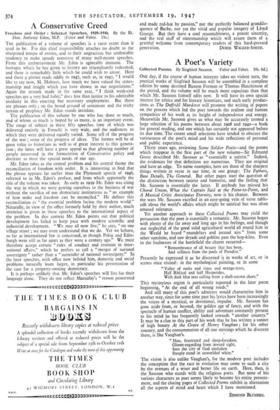A Conservative Creed
Freedom and Order : Selected Speeches, 1939-1946. By the Rt. Hon. Anthony Eden, M.P. (Faber and Faber. 15s.)
THE publication of a volume of speeches is a rarer event than it used to be. For this chief responsibility attaches no doubt to the sharpened tempo of events, and to their ungracious but undeniable tendency to make speedy nonsense of many well-meant speeches. From this embarrassment Mr. Eden is agreeably immune. The hostages which he has given to history are triumphantly redeemed, and there is remarkably little which he could wish to unsay. Here and there g phrase reads oddly in 1947, such as, in 1942, "I would like to say now, M. MolotoV, how much we have valued the states- manship and insight which you have shown in our negotiations." Again the remark made in the same year, "I think week-end speeches are a very bad habit," does less than justice to his admirable assiduity in this exacting but necessary employment. But these are phrases only ; on the broad ground of sentiment and the tricky terrain of prophecy Mr. Eden stands inviolate.
The publication of this volume by one who has done so much, and of whom so much is hoped by so many, is an important event. The range of subject in these fifty speeches (one of which was delivered entirely in French) is very wide, and the audiences to which they were delivered equally varied. Some tell of the progress of the war ; some of the progress of ideas. The former will be of great value to historians as well as of great interest to this genera- tion; the latter will have a great appeal to that gfowing number of people interested in the formulation of Conservative policy and doctrine to meet the special needs of our age.
Mr. Eden takes as the central problem and his central theme the reconciliation of freedom with order. It is interesting to find that the phrase appears far earlier than the Plymouth speech of 1946, referred to in Mr. Eden's preface, and from which apparently the title of the volume was taken. As early as 1939 Mr. Eden was citing the way in which we were gearing ourselves to the business of war without the sacrifice of our democratic institutions as "an example of how order and freedom can be reconciled." He defines this reconciliation as "the essential problem facing the modern world." Naturally, in view of the office formerly held by their author, much attention is given in these speeches to the international aspect of the problem. In this context Mr. Eden points out that political development has failed to keep pace with modern scientific and industrial development. "We may all now live," he says, "on one village street ; we may even understand that we do. Yet we behave, so far as international law is concerned, as though Pekin and Edin- burgh were still as far apart as they were a century ago." We must therefore accept certain "rules of conduct and restraint in inter- national affairs," which he prefers to call a "merger of national sovereignty" rather than a "surrender of national sovereignty." In the later speeches, with office now behind him, domestic and social problems naturally loom larger, in particular his presentation of the case for a property-owning democracy.
It is perhaps unlikely that Mr. Eden's speeches will live for their language alone. They do not reflect Macaulay's "reason penetrated and made red-hot by passion," nor the perfectly balanced grandilo- quence of Burke, nor yet the vivid and popular imagery of Lloyd George. But they have a cool reasonableness, a potent sincerity, and the real stuff of statesmanship which will assure them of a grateful welcome from contemporary readers of this hard-pressed


































 Previous page
Previous page